The UK's top 10 fastest charging electric cars
If you want to get where you’re going quickly, charging speed is as important as range – these are the 10 fastest-charging EVs currently on sale in the UK
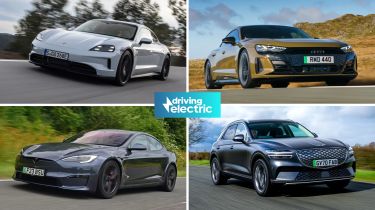
Charging is a big issue when it comes to electric cars. Even though the vast majority of journeys undertaken by car in the UK are well below the maximum range of a typical electric car, range anxiety and concerns over finding a free charger are real. That’s why consumers are drawn towards electric cars with long driving ranges and fast charging capabilities. Below we list the top 10 fastest charging electric cars available in the UK.
The easiest and cheapest way to charge an electric car is to charge at home or at your destination but if you’re undertaking longer drives of hundreds of miles you will need to charge on route and that is where the fastest charging electric cars can be useful. Put simply, fast charging EVs limit the amount of time you have to stop for when recharging your EV’s battery.
Manufacturers will quote a maximum charging speed for every car which is the maximum amount of power in kilowatts (kW) that can potentially be drawn from a charger. However, in most cases there are other factors that can slow down the rate of charging so that you may not actually achieve the quoted maximum charging speed. The outside temperature, how much charge the battery has remaining in it and the speed of the charger will all have an impact.
As EV technology develops, charging speeds are going up. Back in 2011, a Nissan Leaf could charge at a maximum of 46kW, but the best modern EV can top up at almost seven times that rate, if you can find a charger capable of delivering that kind of power.
Below, we’ve taken a look at the top 10 fastest charging electric cars available in the UK. We’ve based our order on the maximum charging speed in kilowatts that a car is capable of. Click the link on each model to read the full reviews...
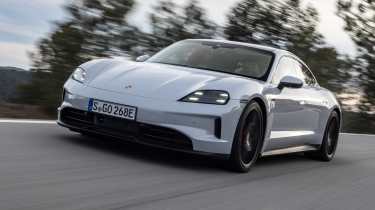
1. Porsche Taycan (320kW)
The Porsche Taycan is the fastest charging EV on this list. There’s a caveat to that: the full 320kW charging rate applies only to models with the Performance Battery Plus option. The standard car comes with a 89kWh gross capacity battery pack and is capable of charging at a maximum speed of 270 kW – though that’s still enough to put it on this list. The upgraded battery on the Taycan 4S gives you a quoted range of between 341 - 399 miles and can charge from 10-80% in 18 minutes.
Read our full Porsche Taycan review to find out more.
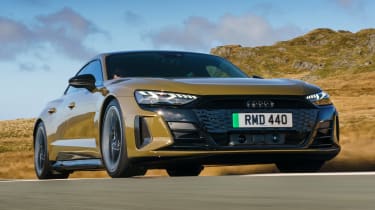
2. Audi e-tron GT (270kW)
The Audi e-tron GT is a strong contender in our list. At 270kW, the maximum charging speed is fast enough to give the Audi’s battery pack – with 84kWh of usable capacity – a 10-80% boost in just over 20 minutes. Of course, that’s if you can find a public rapid charger capable of delivering that – though the car’s charging capability does future-proof it when the public network catches up. With ultra-fast charging and nearly 300 miles of range, the e-tron GT can back up its grand tourer tag with actual ability.
Read our full Audi e-tron GT review to find out more.
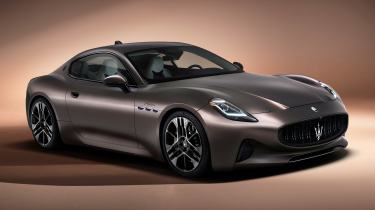
3. Maserati GranTurismo Folgore (270kW)
Maserati’s GranTurismo Folgore, with its 800-volt electric system, has a quoted range of 279 miles and can charge at 270kW. Equipped with a 0-62mph acceleration of 2.7 seconds and a top speed of nearly 200mph, this car is definitely worthy of an electrified road trip. Especially since, with a fast enough charger, you can gain over 60 miles of range in just five minutes.
Read our full Maserati GranTurismo Folgore review to find out more.
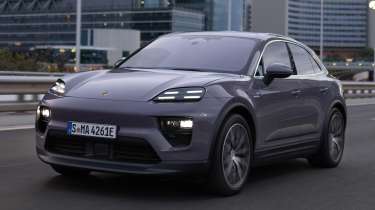
4. Porsche Macan (270kW)
The Porsche Macan is equipped with an advanced 800v architecture capable of charging at speeds of up to 270kW, enabling a 10-80% charge in just 21 minutes. There’s a quoted range of 380 miles for the standard Macan 4, and even with the top-of-the-line Turbo, Porsche claims you should achieve 322 miles. The base 4 model produces 402bhp and accelerates from 0-62mph in 5.1 seconds. With the Turbo, power increases to 630bhp and 1,000Nm of torque, propelling you from 0-62mph in just 3.5 seconds.
Read our full Porsche Macan review to find out more.
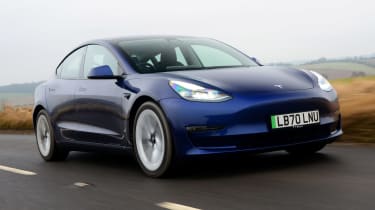
5. Tesla Model 3 (250kW)
The three Teslas have an advantage over the other cars in this list. Even though the 250kW charging speed might not be as quick as that of the Audi, Porsche or Maserati, Tesla’s Supercharger network – currently numbering more than 1,400 charging points – is certainly more consistent than some other public networks.
That 250kW figure is still a peak rather than a constant speed, but pull up to a Supercharger and you can be reasonably confident it’ll approach that – especially if you’ve used the car’s sat-nav to pre-condition the battery. Standard Range Model 3s can charge at up to 170kW, with Long Range and Performance models getting the full whack, capable of adding more than 200 miles of range in just half an hour.
Read our full Tesla Model 3 review to find out more.
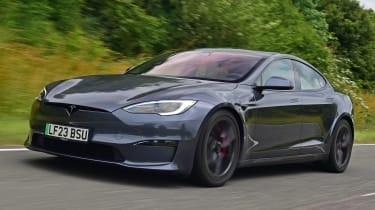
6. Tesla Model S (250kW)
The second in our trio of Teslas is the Model S, which matches its siblings in charging speed capabilities but surpasses them in performance and range. The top models boast a quoted range of 405 miles on the Model S Dual Motor All-Wheel Drive model and can achieve 0-62mph in just under 2 seconds with the Model S Plaid. However, it's worth noting that the Model S is exclusively available in left-hand drive format.
Read our full Tesla Model S review to find out more.
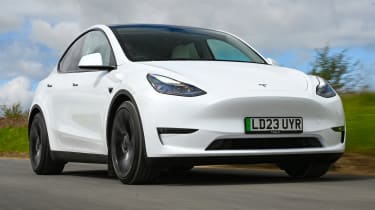
7. Tesla Model Y (250kW)
It’s no surprise to see the Tesla Model Y crossover next to the Model 3 and Model S here, since all three share a drivetrain and several features, the 3 and Y are still offered with the wheel on the correct side for UK buyers. The bulkier, less aerodynamic Model Y can’t quite match its saloon-shaped sibling for range (331 miles for the Long Range car, versus 374 with the Model 3), but otherwise it’s just as quick to charge; get that full 250kW for as long as possible, and a 10-80% top-up takes only 27 minutes.
Read our full Tesla Model Y review to find out more.
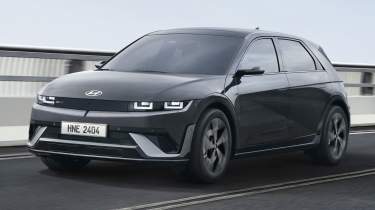
8. Hyundai Ioniq 5 (240kW)
The latest Hyundai Ioniq 5 has lost none of its visual impact. It rides on the same architecture as the Genesis GV60 and Kia EV6, but with the most recent updates to the Ioniq 5, the range has increased to up to 324 miles and it has surpassed its siblings in charging speed, increasing from 233kW to 240kW. Hyundai’s retro-futuristic styling, pixelated lights and blocky proportions are unmistakable and have the potential to replenish 80% of its range in just 18 minutes on a DC charger.
Read our full Hyundai Ioniq 5 review to find out more.
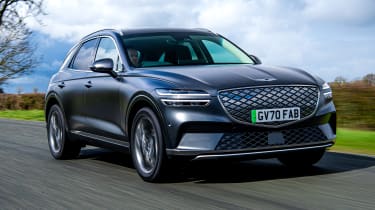
9. Genesis Electrified GV70 (233kW)
Genesis offers a choice of combustion-powered GV70s, but the Electrified model gives buyers another option. It’s bigger than the GV60 above but with a 77.4kWh battery pack and the same 233kW maximum charging rate its figures are identical to those of the other Genesis, Hyundai and Kias here, making for equally rapid recharging times if you can find a charger to take advantage of them. More understated than the GV60, the GV70’s size does impact range (283 miles) but at the maximum charging rate, a 10-80% fill still takes under 20 minutes.
Read our full Genesis Electrified GV70 review to find out more.
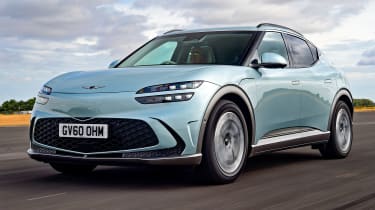
10. Genesis GV60 (233kW)
Another car capable of covering more than 300 miles in its longest-range format – in this case, Premium trim, with a single 226bhp electric motor drawing current from the 77.4kWh battery pack – the strikingly-styled Genesis GV60 also benefits from one of the fastest peak charging rates of any EV. The 233kW figure is shared with the other Genesis, Hyundais and Kias in this list, and if you can find a charger fast enough to deliver it, a 10-80% charge can take just 18 minutes – you’d struggle to get in and out of a motorway services in that time.
Read our full Genesis GV60 review to find out more.
Why is your electric car not charging at the full quoted speed?
The maximum charging speeds quoted by car manufacturers and used to compile this list are precisely that - maximum charging speeds. In a real-world scenario there are a number of factors that may make actually achieving those kinds of speeds unlikely. The ambient temperature, the temperature of the battery and the amount of charge left in the battery will all affect the amount of power an electric car can draw from a charger.
In addition to this, the speed of the charger will also limit the amount of power available to charge the car. The best you will get from a 150kW rapid charger is 150kW but in reality, if there are lots of other cars charging nearby even that could be reduced.
